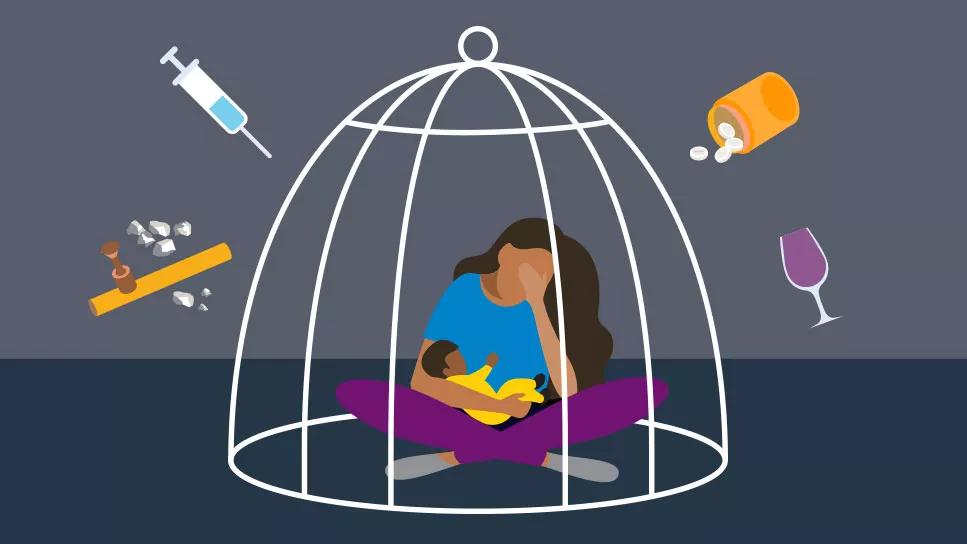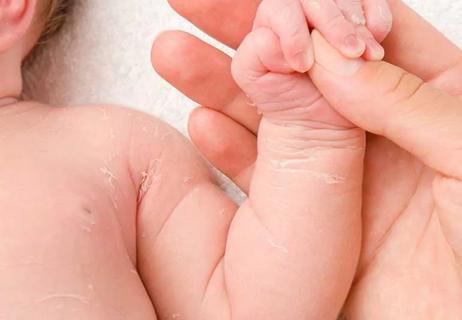Neonatal opioid withdrawal syndrome, or NOWS, can develop when a fetus is exposed to opioids, nonmedical drugs or even some prescription drugs during pregnancy

The first few days, weeks and months of life can be challenging as a newborn develops and adapts to the world around them. But babies who’ve been introduced to opioids, prescription medications and other nonmedical drugs during pregnancy are faced with even more challenges, as their bodies need to adjust to life without those substances.
Advertisement
Cleveland Clinic is a non-profit academic medical center. Advertising on our site helps support our mission. We do not endorse non-Cleveland Clinic products or services. Policy
According to 2021 data, for every 1,000 newborn hospital stays, about seven newborns present with symptoms of opioid withdrawal. Called neonatal opioid withdrawal syndrome (NOWS) (formerly called neonatal abstinence syndrome), this condition can affect newborns when they have prolonged exposure to drugs, including some prescription medications.
“Although some of these babies are born dependent on heroin or other nonmedical drugs, about one-third are born to middle-class women who have become silently addicted to prescription medications for issues such as chronic back pain and depression,” clarifies neonatologist Sabine Iben, MD.
What are newborn withdrawal symptoms? And how can you make sure your baby can stay safe and recover when serious symptoms arise? Dr. Iben explains.
Babies aren’t born “addicted to drugs” — at least not in a formal definition of the term. To develop an addiction, you have to consciously engage in compulsive drug-seeking behavior or perform an activity despite its negative or harmful consequences. Still, babies can be physically dependent on substances their bodies were introduced to during pregnancy.
That’s because nutrients and other substances, like certain medications, can pass through the placenta into the fetal bloodstream. Some of the substances that have been shown to have a direct negative impact on a fetus include:
Advertisement
When the fetus is exposed to these substances, its body can become dependent on them. After separation from the placenta, dwindling drug levels within their bodies can cause withdrawal symptoms.
Having a baby born in a state of withdrawal can have a significant impact on family functioning, even when you have a substance use disorder. Symptoms usually surface 24 to 48 hours after birth, but they may not appear until after the baby has been discharged from the hospital.
NOWS may last from one week up to six months depending on when the substances have left your baby’s body and they’ve grown accustomed to not interacting with those substances.
Exposure to substances that cause withdrawal symptoms can also contribute to:
And withdrawal itself can include a range of symptoms like:
In extreme cases, opioid withdrawal can cause seizures in babies.
“If a baby exhibits this group of symptoms, especially if you are using opioids, even when prescribed, or you are not sure about medications you are taking, bring the infant to your pediatrician to be evaluated. The baby may need to be admitted to the hospital,” Dr. Iben stresses.
Watching your baby go through these experiences can be frightening and disheartening. But there are some things you can do to help soothe them and manage their withdrawal:
Advertisement
If these interventions don’t work, intensive care staff can give your infant a small dose of morphine that’s slowly and gently lowered until symptoms stop, which may take several weeks. In the most serious cases, prolonged hospitalization may also be recommended to monitor you and your baby continuously until withdrawal symptoms subside.
Many mothers of infants born with this withdrawal syndrome don’t consider themselves to have an addiction or a substance use disorder. Instead, they may be victims of an epidemic of indiscriminate opioid prescription.
“If you have any type of chronic pain, it’s important to avoid opioids. Opioids are only recommended for acute pain (the type of pain you’d experience after surgery or serious injury, for example),” advises Dr. Iben. “Avoiding opioids is especially important during your childbearing years.”
If a doctor or dentist offers to prescribe something for your pain, ask whether it’s a narcotic. If the answer is yes, ask if you can start with an alternative.
Efforts are underway to educate more physicians about alternative treatments for chronic pain. And several potential treatments — including medication and nonmedication options — are currently being studied to help babies with NOWS. An approach many hospitals have been using over recent years focuses on limiting the need for postnatal treatment with opioids using the Eat-Sleep-Console approach. Additionally, studies are being conducted to determine long-term effects of NOWS in children.
Advertisement
Until we have more standardized approaches to treating NOWS, what’s most important is your and your baby’s safety. Do what you can to avoid serious symptoms, seek timely evaluation and treatment, soothe your baby and ask for help when you need it the most. If you or your baby need assistance with withdrawal symptoms or substance use, you’re not alone.
“We all need to be aware of this growing problem and work together to prevent the toll it takes on babies and families,” encourages Dr. Iben.
Advertisement

Sign up for our Health Essentials emails for expert guidance on nutrition, fitness, sleep, skin care and more.
Learn more about our editorial process.
Advertisement

Gentle care, like moisturizing, washing and soft brushing, can help clear up cradle cap

Gripe water isn’t regulated by the FDA, and research doesn’t support its use

Jaundice that’s present at birth or lasts more than a week should be evaluated by a pediatrician

When tight neck muscles give your newborn a head tilt, these gentle exercises can go a long way

Crossed eyes in a newborn are fairly common, typically harmless and usually go away

Most parents report an improvement in breastfeeding, but there’s a chance the procedure won’t solve the issue

All babies go through a perfectly normal peeling phase in the first couple weeks

Dietary and behavioral changes can help get things moving again

Even small moments of time outdoors can help reduce stress, boost mood and restore a sense of calm

A correct prescription helps your eyes see clearly — but as natural changes occur, you may need stronger or different eyeglasses

Both are medical emergencies, but they are very distinct events with different causes